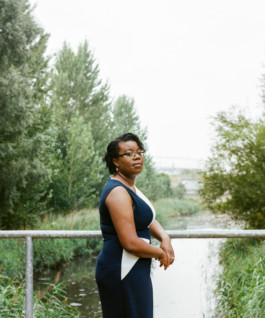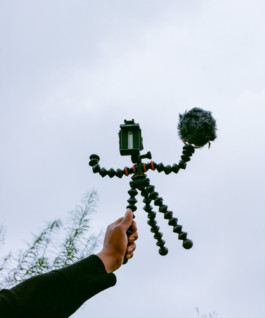Matilda: “How would you feel managing someone’s life over the phone? No face to face, no verbal clues, no examination”


listen:
Photography: Myah Jeffers
Audio Producer: Mae-Li Evans
Music: Chris Zabriskie
read:
At the start of the pandemic, I decided that I needed the proper mini tripod that I could put my phone on. We’ve all experienced having to do Zoom call after Zoom call and, after a while, your hand starts to hurt. Other social activities, parties or whatever - everything was on Zoom. And this was brilliant, because they can put it on the kitchen window, still wash and still participate in everything that they need to.
My name is Dr. Matilda Esan. And I am currently a newly qualified GP.
During the pandemic, at the height of it, GPs had to close their doors. But we were still calling patients. We would go into an empty surgery, and spend the day calling people, trying to sort their problems out on the phone. I think the first few days me and my colleagues were really kind of worried and really scared because the practice we were working in - the trainees didn’t really do that much telephone triage. So everything that we did was mainly face to face. It was kind of just being thrown at the deep end. And, you know, having this risk where you’re trying to assess people on the phone.
Obviously, people have varying access to technology. So some people: great, you could do a video call. But then reception’s not always working, they can’t always figure it out. It was a big level of risk. You know, sometimes you couldn’t make the video work. Sometimes they couldn’t send you pictures. And you’re trying to manage people with breathing difficulties over the phone, people telling you about rashes, you can’t see over the phone. And it’s not like before where you had an option to bring them in.
With the telephone triage usually, when we would go in in the morning, you have your list, hopefully you’ve got right number, it goes through.
‘Hi, I’m Dr Esan, I’m calling from x’ and usually the patient says ‘Oh, hi’.
You obviously need to confirm that you’re speaking to the right person.
‘Can you confirm the first line of your address, can you tell me your date of birth?’
If you’re having a good day, then the problem that it says on the side should match what they want to talk about, but sometimes it doesn’t happen that way. You might have ‘headache’, and then you start speaking to the person and they’re like ‘No, I’ve got back pain’ and you’re like, ‘Oh okay, are we talking about back pain?’. Usually, you know, you just ask them ‘Could you tell me a bit more about it?’.
You kind of have to quickly build a rapport, there’s no eye contact, there’s no nonverbal cues as you would have if they were in the room. So you kind of have to listen out for silences. Do they sound like they’re upset? Do they sound like they’re low? Do they sound like they’re happy? Those kind of things.
The time that you have for consultations varies from practice to practice, some practices it’s eight minutes, some practices it’s 10 minutes. Others it’s 15. You’ve got a wide variation. And in that 10 minute slot, mind you, that includes the time it takes them to pick up the phone, the time for you to introduce yourself. So in reality, you’ve probably got maybe about six, eight minutes to kind of thrash through the problem. Make a plan, tell them the safety advice. Sometimes, realistically, you can’t do everything.
Sometimes you get it right. You ask them, ‘Oh, you sound upset, are you okay?’ and they’re like, ‘Oh, actually, this is what’s going on’. Sometimes you think it’s okay, get to the minute where you’re about to drop the phone, and they’re like, ‘Oh, actually, I don’t feel okay, I feel rubbish. This is this, this is that’ and you’re just like, how did I miss it?
Sometimes it feels like you’re two parallel lines, and you haven’t found the meeting point. You’re trying to help a patient in this way. They want you to help them in that way. Or you thought this was the problem, but something else is actually the problem.
I’d say 80% of the time you get it right, 20% of the time you come away from it and you think, did I get it right? Did I listen properly? Or maybe you’ll get a letter to say that your patient went to A&E and you’re thinking, well, that wasn’t the plan, oh, why did they end up going? When you’re just like, hmm, okay, I need to reflect on that.
The flurry of technology that we’ve had access to as GPs has been amazing. Who would have thought you could get someone to send you a photo of their rash. The biggest problem with skin issues is patients, they’re not necessarily very good at describing it. ‘It’s red, It’s itchy.’ It’s like, ‘Okay, where is it?’. ‘It’s on my back.’ Actually when they say back they might actually mean their shoulder.
Having this kind of tele-virtual medicine, even the video, people have been talking about it for years. It was kind of almost like this evil medicine where, oh my god, how can doctors be treating patients over video? Are we even covered to do that? All these companies were like demonised. How dare they do video, that’s not medicine. Yet, the global pandemic hits and we’re like, give me video, give me text by photo, give me email photo.
Prior to the pandemic, you would see patients and they would be grateful for their care, they might send you a box of chocolates, they might send you a thankyou card, or you could see the gratefulness so there was kind of an implied gratitude. During the pandemic, every phone call, people would be like, ‘Thank you so much for calling me. We really appreciate what you’re doing. Stay safe’. It was weird getting people saying thank you for calling. Yeah, there was this awesome, overwhelming sense of gratitude.
I remember there was a week where literally all of my consults were like ‘Thank you, doctor, you’re doing a great job, keep safe. We really appreciate what you’re doing’.
It was weird because you try to add the human touch but patients took the human touch and the personalisation to a whole new level, and you kind of almost felt a frog in your throat afterwards. Like, oh, they’re really like, really grateful and I am a bit upset because I’m stuck at the end of the phone but I’m glad that you’re grateful that I called you. So that was. Yeah. Emotional.
When things were building in the pandemic, even amongst my friendship groups, my other friends who are doctors, it would be like, ‘Well, you guys are closed. You’re not even doing anything’ and it’s like, no: point of correction. I speak to about 20 people a day on the phone. Oftentimes, that’s back to back. That’s me having to do the documentation. That’s me having to do the referrals, I have to deal with the risk. I have to go home and sleep at night with my decision of what I did and my justifications for not bringing someone in face to face or sending them to the hospital, or my justification for feeling like I think we can manage this over the phone with follow up.
The stress levels for many GPs during the pandemic was through the roof and people are like, ‘Why is it through the roof? Well you’re just sitting on the phone’. But you know, my question would be, how would you feel, you know, managing somebody’s life over the phone? No face-to-face, no verbal cues, no examination.
How would you feel? Would you be able to sleep at night?
An Empathy Museum project made with the support of NHS England and NHS Improvement, The Health Foundation, and Arts Council England